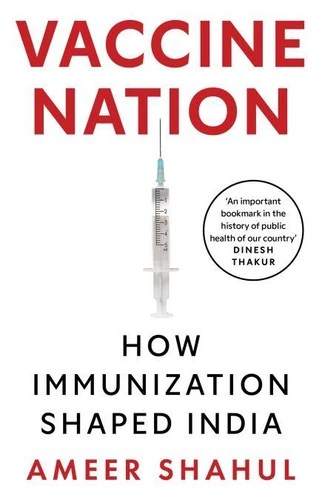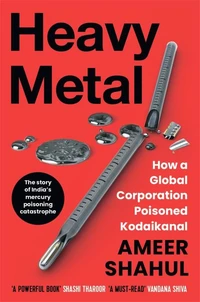Nouveauté
Vaccine Nation. How Immunization Shaped India
Par :Formats :
Disponible dans votre compte client Decitre ou Furet du Nord dès validation de votre commande. Le format ePub protégé est :
- Compatible avec une lecture sur My Vivlio (smartphone, tablette, ordinateur)
- Compatible avec une lecture sur liseuses Vivlio
- Pour les liseuses autres que Vivlio, vous devez utiliser le logiciel Adobe Digital Edition. Non compatible avec la lecture sur les liseuses Kindle, Remarkable et Sony
- Non compatible avec un achat hors France métropolitaine
 , qui est-ce ?
, qui est-ce ?Notre partenaire de plateforme de lecture numérique où vous retrouverez l'ensemble de vos ebooks gratuitement
Pour en savoir plus sur nos ebooks, consultez notre aide en ligne ici
- Nombre de pages504
- FormatePub
- ISBN978-93-6113-068-7
- EAN9789361130687
- Date de parution24/08/2025
- Protection num.Adobe DRM
- Infos supplémentairesepub
- ÉditeurPan Macmillan India
Résumé
INDIA'S IMMUNIZATION STORY - FROM COLONIAL TESTING GROUND TO GLOBAL VACCINE HUBWhen Edward Jenner pricked a young boy's arm in 1796 to inoculate him against smallpox, he ignited a revolution. Vaccination would go on to transform human health, enabling the eradication and prevention of deadly diseases and saving countless lives. But India remained on the margins of these developments - its people often subjects of Western trials, but its own scientific institutions underdeveloped.
This began to change in 1893, when Soviet-born scientist Waldemar Haffkine arrived in Calcutta to combat endemic cholera. His pioneering efforts laid the groundwork for India's first vaccines and vaccine laboratories and inspired a generation of scientists like Sahib Singh Sokhey and Shanti Swarup Bhatnagar, who, after Independence, transformed vaccination into a national mission of self-reliance.
Vaccine Nation is the untold chronicle of how India emerged from colonial dependency to become a global vaccine powerhouse. From the battles against cholera and plague to mass campaigns against polio, tuberculosis and typhoid, the founding of the Serum Institute and the creation of COVAXIN and COVISHIELD, this is a saga of resilience, scientific ingenuity and defiance in the face of global pharma monopolies and resource-constrained public health systems.
Today, India vaccinates over a billion people and supplies affordable vaccines to most of the nations across the Global South. But with the rise of geopolitical tensions, pandemic fatigue and profitdriven global markets, a new question looms: Can India retain its humanitarian spirit in a world where public health is increasingly privatized?Sweeping in its scope, Vaccine Nation offers a comprehensive account of India's epic immunization journey - a story of ambition, sacrifice and the making of a scientific nation.
This began to change in 1893, when Soviet-born scientist Waldemar Haffkine arrived in Calcutta to combat endemic cholera. His pioneering efforts laid the groundwork for India's first vaccines and vaccine laboratories and inspired a generation of scientists like Sahib Singh Sokhey and Shanti Swarup Bhatnagar, who, after Independence, transformed vaccination into a national mission of self-reliance.
Vaccine Nation is the untold chronicle of how India emerged from colonial dependency to become a global vaccine powerhouse. From the battles against cholera and plague to mass campaigns against polio, tuberculosis and typhoid, the founding of the Serum Institute and the creation of COVAXIN and COVISHIELD, this is a saga of resilience, scientific ingenuity and defiance in the face of global pharma monopolies and resource-constrained public health systems.
Today, India vaccinates over a billion people and supplies affordable vaccines to most of the nations across the Global South. But with the rise of geopolitical tensions, pandemic fatigue and profitdriven global markets, a new question looms: Can India retain its humanitarian spirit in a world where public health is increasingly privatized?Sweeping in its scope, Vaccine Nation offers a comprehensive account of India's epic immunization journey - a story of ambition, sacrifice and the making of a scientific nation.
INDIA'S IMMUNIZATION STORY - FROM COLONIAL TESTING GROUND TO GLOBAL VACCINE HUBWhen Edward Jenner pricked a young boy's arm in 1796 to inoculate him against smallpox, he ignited a revolution. Vaccination would go on to transform human health, enabling the eradication and prevention of deadly diseases and saving countless lives. But India remained on the margins of these developments - its people often subjects of Western trials, but its own scientific institutions underdeveloped.
This began to change in 1893, when Soviet-born scientist Waldemar Haffkine arrived in Calcutta to combat endemic cholera. His pioneering efforts laid the groundwork for India's first vaccines and vaccine laboratories and inspired a generation of scientists like Sahib Singh Sokhey and Shanti Swarup Bhatnagar, who, after Independence, transformed vaccination into a national mission of self-reliance.
Vaccine Nation is the untold chronicle of how India emerged from colonial dependency to become a global vaccine powerhouse. From the battles against cholera and plague to mass campaigns against polio, tuberculosis and typhoid, the founding of the Serum Institute and the creation of COVAXIN and COVISHIELD, this is a saga of resilience, scientific ingenuity and defiance in the face of global pharma monopolies and resource-constrained public health systems.
Today, India vaccinates over a billion people and supplies affordable vaccines to most of the nations across the Global South. But with the rise of geopolitical tensions, pandemic fatigue and profitdriven global markets, a new question looms: Can India retain its humanitarian spirit in a world where public health is increasingly privatized?Sweeping in its scope, Vaccine Nation offers a comprehensive account of India's epic immunization journey - a story of ambition, sacrifice and the making of a scientific nation.
This began to change in 1893, when Soviet-born scientist Waldemar Haffkine arrived in Calcutta to combat endemic cholera. His pioneering efforts laid the groundwork for India's first vaccines and vaccine laboratories and inspired a generation of scientists like Sahib Singh Sokhey and Shanti Swarup Bhatnagar, who, after Independence, transformed vaccination into a national mission of self-reliance.
Vaccine Nation is the untold chronicle of how India emerged from colonial dependency to become a global vaccine powerhouse. From the battles against cholera and plague to mass campaigns against polio, tuberculosis and typhoid, the founding of the Serum Institute and the creation of COVAXIN and COVISHIELD, this is a saga of resilience, scientific ingenuity and defiance in the face of global pharma monopolies and resource-constrained public health systems.
Today, India vaccinates over a billion people and supplies affordable vaccines to most of the nations across the Global South. But with the rise of geopolitical tensions, pandemic fatigue and profitdriven global markets, a new question looms: Can India retain its humanitarian spirit in a world where public health is increasingly privatized?Sweeping in its scope, Vaccine Nation offers a comprehensive account of India's epic immunization journey - a story of ambition, sacrifice and the making of a scientific nation.




